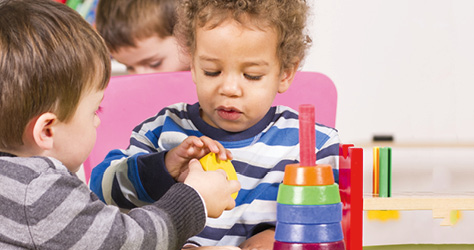It's not easy to teach a two-year old to share
If you don’t want to hear ‘it’s mine’ on every play date, it’s time to teach your little one to share. Here’s how.
At a glance
- Practise taking turns at home so little ones start to understand sharing
- Put favourite toys away before play dates to avoid any rows
- Talk about what toys they would like to play together with before their friend arrives

Taking turns
Teaching a two-year-old to share is not easy. In fact, sharing is a concept they probably won’t even get until they are nearer three. They've only just realised that their lovely, shiny new toys belong to them – so why would they want to give them away to someone else?
However, you can gently introduce them to the idea once they've turned two. Rather than telling them to share, call it ‘taking turns’. Practise at home; play catch with a ball and say ‘my turn’, ‘your turn’ each time you throw, share food by taking it in turns to take a bite out of a biscuit or a banana, saying ‘my turn’, ‘your turn now’. You can do the same with reading books by taking it in turns to turn the page.
Play dates
When it comes to play dates, don’t insist two-year-olds share their toys as you risk stirring up feelings of resentment rather than kindness. Better to put away favourite toys before their friend even arrives to avoid a row. Praise them for sharing when you can, even if they’re only half-heartedly showing a toy to their friend while maintaining a vice-like grip on it. They’ll get better at it in time.
It can be tempting to intervene when they’re tussling over a toy and insist they share, but they won’t understand yet. Better to stand back and let them solve a row themselves as long as it doesn't get too violent. Often the losing child will just go off and find something else to play with (sometimes prompting the winning one to drop the prized toy and head off after the new one!)
Sharing toys
As your little one turns three, they’ll have a better idea of what sharing means. That’s because of the developmental stage they’re at: they’re learning how to play co-operatively with friends and gradually understanding empathy.
Now you’ll be able to encourage them to share toys on a play date – but do it by stressing how much more fun they’ll have if they share, rather than telling them off for not sharing. They still may not be happy to share certain favourite toys; don’t force the issue but put away that toy instead. Talk to your little one before their friend arrives to see what toys they’d like to play with together – this will get them thinking about sharing in advance. Put out toys that take two to play with, such as walkie talkies, a football or bats and ball. Perhaps suggest their friend brings a toy, so yours isn't the only one who has to share their things.
If a tussle breaks out over a particular toy, suggest each child takes a turn for a set time (set your phone alarm or a kitchen timer). They’ll probably have lost interest by the time it goes off, anyway.
Some things just weren't made for sharing
Although it’s important to teach your little one to share, we should respect that there are some things they won’t want to share, such as their night-time cuddly toy and do our best to make sure siblings and friends respect their things too. Lots of children get really distressed if others manhandle their prized belongings, which will make them less likely to share in the future.